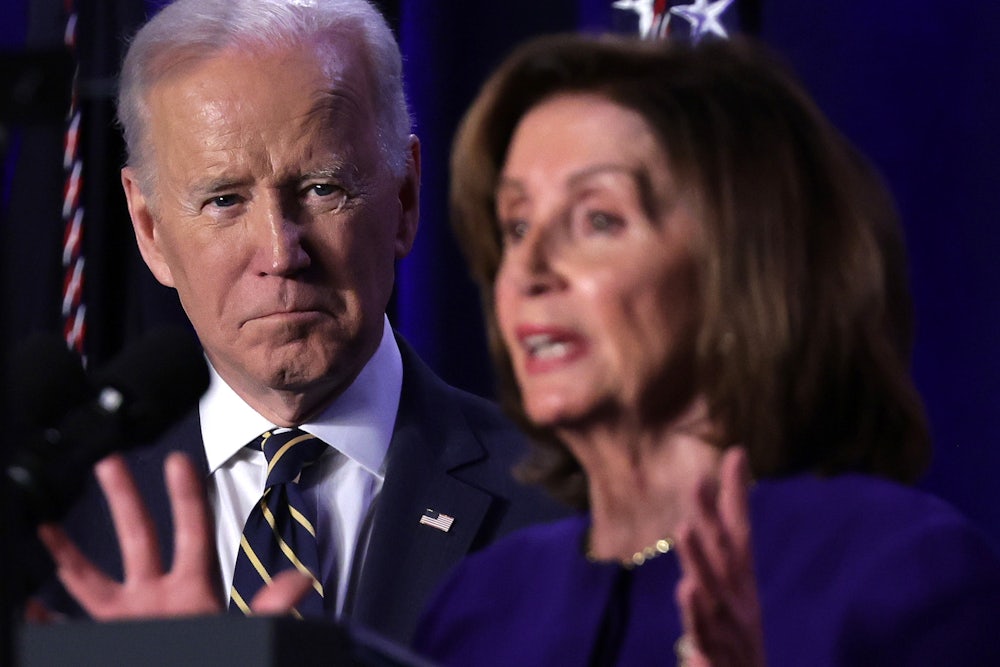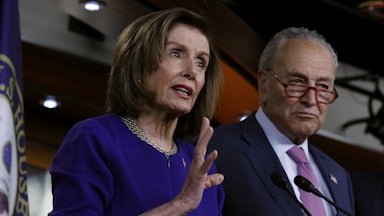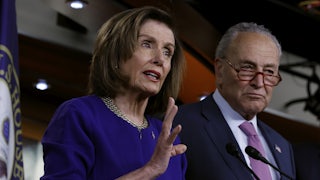Are things finally turning around for congressional Democrats? A summer dominated by the Supreme Court’s overturning of Roe v. Wade and explosive January 6 Commission hearings have pushed the party to narrow leads in generic ballot polling. FiveThirtyEight’s tracker now has Democrats and Republicans tied while several recent polls have shown sharp gains for President Biden’s party when voters are asked who they would prefer to have control of Congress. On Tuesday, voters in Kansas—a state that hasn’t gone blue in a presidential election since 1964—strongly rejected a proposed amendment that would have likely banned abortion in the state.
Polling from YouGov and Indivisible in Arizona, meanwhile, found that voters in the state overwhelmingly reject both candidates who supported Donald Trump’s “Big Lie” and those in favor of restricting abortion in the state. According to the results, which were conducted between July 28 and July 31, 51 percent of voters surveyed said they would view a candidate who believed the 2020 election results were fraudulent “less favorably,” while only 23 percent said they would view them “more favorably.”
Meanwhile, 55 percent said they would view a candidate in favor of banning abortion after six weeks “less favorably,” while just a third of voters said doing so would lead them to view them “more favorably.” When asked to choose between a generic Democrat holding the view that abortion should be legal through the first trimester and in any cases involving rape or incest and a generic Republican that favors banning all abortions, 60 percent chose the Democrat; just 27 percent went with the hypothetical Republican.
“We’ve been saying it for a while: Abortion is an energizing issue for our base and it’s also an issue where there’s a huge amount of potential to reach out to folks who are not reliably with us,” Indivisible co-founder Leah Greenberg told The New Republic. “The conventional wisdom has been that this is an election where the enthusiasm is on the Republican side. That’s just not the case.”
The results in Kansas have rattled Republicans, who have long been expecting to benefit from a wave election in November—not without just cause. But the high voter turnout in a deep red state that put repealing abortion protections on the ballot suggests that Democrats might be able to get masses of voters to the polls—if they can convince them that, if elected, they’ll protect reproductive rights. (As my colleague Daniel Strauss noted, turnout in the Kansas primary reached numbers more typically associated with presidential elections than midterm cycles, let alone a midterm primary.)
The focus on Donald Trump and the GOP’s efforts to overturn the 2020 election has similarly soured many on the Republican Party, making a landslide election less likely. “If the headlines over the spring were about stalled progress in Washington, the headlines over the summer have been about the human consequences and the consequences of our democracy of MAGA extremism,” Greenberg said. Democrats, meanwhile, have been aided by the results of GOP primaries, which have boosted candidates “who range from ridiculous to terrifying. We’re now in a situation where it’s not a contest between a Democrat and a generic someone else. It’s a contrast between a Democrat and an actual human being and in a lot of cases, those human beings are patently unfit for office.”
Room for more movement remains as well. Last week, Joe Manchin and Chuck Schumer reached a deal on the Inflation Reduction Act, a stripped-down version of the Build Back Better Act, which had been stalled—and thought to be totally dead—for months. That bill, which includes nearly $800 billion in climate spending, prescription drug pricing reform, and deficit cuts, would be arguably the party’s biggest major legislative win since the fall, when a bipartisan infrastructure bill passed. The measure is currently in limbo, thanks in large part to the mercurial Arizona Senator Kyrsten Sinema, but it remains the party’s best hope to make the case that they are actually delivering results.
The results in Kansas point to another reality for Democrats: Speaking loudly on issues voters actually care about matters. In the immediate wake of the Supreme Court decision that gutted Roe’s protections, the Biden administration was notably slow to respond, only putting out milquetoast executive actions in the weeks after the decision. The Kansas result demonstrates that even voters in red states respond to major issues like abortion access. Having spent months anticipating getting blown out in November, Democrats had grown too tepid and wary of controversy. Now, Democrats have some proof that voters will respond to aggressive campaigning and boisterous rhetoric in defense of reproductive rights and our democracy—both of which are under threat from extremists.
Naturally, major headwinds, remain. The economy—and, in particular, inflation—remain the most important issues for voters; asked to pick their five most important issues in the upcoming election, the YouGov/Indivisible poll found that 49 percent selected inflation and 35 percent chose “jobs and the economy,” the two most common answers. “Reproductive rights and abortion” was tied for third with the “climate change and the environment” and “budget, taxes, and the federal deficit” with 31 percent selecting it in their top five. Overcoming inflation in the short term will require some good fortune—something that has been in short supply for Democrats and, in particular, Joe Biden recently. But the repeal of Roe and the January 6 hearings have given Democrats an opening to stake out a firm position on a favorable issue for the first time in months. They may as well take their best shot.










